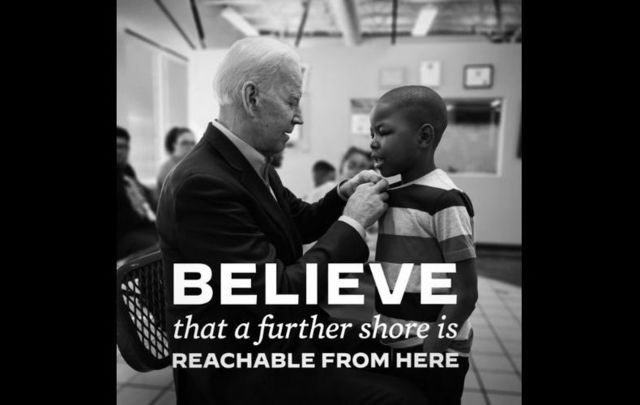
Monday
Ah, a political ad that hits my sweet spot: Joe Biden reading a Seamus Heaney poem. The poem, which Bill Clinton also read when helping negotiate the peace in Northern Ireland, is taken from Heaney’s play The Cure of Troy.
Significantly at this time of Covid, the play itself is a verse translation of the Sophocles play Philoctetes, which addresses the challenges of empathy in response to illness. I’ve written about how philosopher Nussbaum uses Sophocles’s play to illustrate how literature can turn us into better human beings.
The play is about the attempt to woo back the embittered Greek archer Philoctetes, without whose skills the Trojan war cannot be won. The Greeks have earlier abandoned Philoctetes on an island because of his noxious wound, and the play compares reconciliation approaches, Odysseus’s cynical instrumentalism or Neoptolemus’s youthful and principled idealism. Ultimately the young man’s care for Philoctetes proves more effective than Odysseus’s trickery, and the archer rejoins the Greeks.
Given Biden’s own refusal to succumb to heart-rending loss, we can see why the poem speaks to him. Add in the danger of becoming numb to over 230,000 Covid deaths, and we can see why the vice president would resonate to the line, “They get hurt and get hard.” Suffering people can even become sadistic (“they torture one another”), applauding a president who tears children away from their mothers and eggs on brutal police and white supremacists.
Yet if history often appears hopeless (“Don’t hope on the side of the grave”), it also offers us moments when it appears to rhyme with hope. “Once in a lifetime,” Heaney writes, “the longed for tidal wave of justice can rise up.” According to Irish write Darach Ó Séaghdha in a fine article on the poem, the play was written about Nelson Mandela’s release from Robben Island and is “stacked with unmistakable allusions to the contemporary situations in South Africa and Northern Ireland.”
With such bright historical examples in mind, Heaney’s poem gives us permission to hope in miracles. In fact, such hope can result in “self-healing,” building on itself to become a self-fulfilling prophecy. Here’s the poem:
The Cure of Troy
Human beings suffer.
They torture one another.
They get hurt and get hard.
No poem or play or song
Can fully right a wrong
Inflicted and endured.
The innocent in gaols
Beat on their bars together.
A hunger-striker’s father
Stands in the graveyard dub.
The police widow iin veils
Faints at the funeral home.
History says, “Don’t hope
On the side of the grave,”
But then, once in a lifetime
The longed for tidal wave
Of justice can rise up
And hope and history rhyme.
So hope for a great sea-change
On the far side of revenge.
Believe that a further shore
Is reachable from here.
Believe in miracles.
And cures and healing wells.
Call miracle self-healing,
The utter self revealing
Double-take of feeling.
If there’s fire on the mountain
And lightning and storm
And a god speaks from the sky
That means someone is hearing
The outcry and the birth-cry
Of new life at its term.
It means once in a lifetime
That justice can rise up
And hope and history rhyme.
To be sure, Séaghdha cautions that, later in the play, Heaney warns against facile hope, urging us to “suspect too much sweet talk.” Donald Trump, for instance, has been basing his do-nothing response to Covid on his longing for a miracle in which the illness just disappears. Many of his followers believe in the equivalent of “cures and healing wells.” Hydroxychloroquine anyone?
That’s why it’s important that Heaney talks about “a great sea-change/ On the far side of revenge.” A full-bodied hope that has grapples with volatile emotions supersedes empty rhetoric. After mentioning “sweet talk,” the passage Séaghdha mentions continues on,
But never close your mind…
I leave, half-ready to believe.
As we look to election day tomorrow, many of us are “half-ready to believe” that our current nightmare will soon end and that we can begin restoring the soul of America. Even if Biden wins, of course, we will face daunting challenges. But because hope and history have occasionally rhymed in the past, they may do so again.
Further thought: In Biden’s ad, the second stanza, which spells out some of the specific wrongs mentioned in the first stanza, gets dropped. The meaning isn’t changed and it doesn’t change Biden’s point, but it does make the poem harder-hitting. The ad, by contrast, prefers to be more gauzy.

